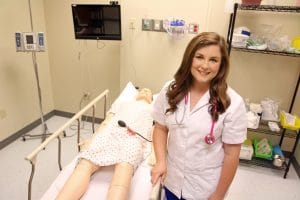 Morgan Layssard, a senior from Bradley, Ark., said she is following her dream of helping people “at their best and worst times” by receiving a nursing degree from Southern Arkansas University.
Morgan Layssard, a senior from Bradley, Ark., said she is following her dream of helping people “at their best and worst times” by receiving a nursing degree from Southern Arkansas University.
Her recent election as District 1 director of the Arkansas Nursing Students’ Association will surely rank as a highlight of her academic career. Layssard was elected to the post earlier this month during the state convention of the ANSA in Little Rock. She said she “didn’t get up that morning” thinking about seeking the post.
“I had no idea I would even run for director,” Layssard said of her Oct. 7 election, “but I applied that day. I thought it would be interesting and I would love to serve on a state board. I was super-excited to be elected.”
She said her duties will include serving as a liaison between SAU’s Department of Nursing, other schools in the district and the state board. She will attend monthly meetings, raise funds and work with different philanthropies. She will also attend the national convention next spring in Orlando, Fla. She will serve as director for one year.
Layssard said there was “never really a question” about where she would go to nursing school, or college. “SAU has that small feel that I really enjoy, but also, everyone here is willing to help you. I just couldn’t imagine going anywhere else – it was the only university that I applied to.”
“I always wanted to work in health care,” she said. “We help people on their best and worst days and that can be an amazing experience. I knew SAU had a good degree program in nursing and getting my degree here will help me do what I want, which is to try make peoples’ future a little bit better and brighter.”
Noting that nurses spend more time in direct contact with patients than physicians, whose time may be “spread thin” among patients, Layssard said she has seen the highs and lows of nursing at clinicals.
“You have to learn how to detach, and that can be hard,” she said. “That might be the greatest challenge in nursing because you don’t expect to become so attached. I’m a very tender-hearted person – I want to help, I want to brighten someone’s day. It’s difficult when you’re just starting out. You learn with experience. There are no books to tell you how to deal with a sad situation.”
Having recently completed a round of pediatric clinicals at Arkansas Children’s Hospital, Layssard said she wants to work with infants and children.
She praised SAU’s nursing faculty. “Their doors are always open, they are always there for your questions and concerns,” she said. “All are tests are geared toward the state board exam, and I feel like you are well-prepared to enter the workplace.”
Close relationships are formed among nursing students. “We understand and appreciate one another’s hardships,” she said. “Nursing school can be hard, and you build relationships built on that. Sometimes you need people to bring you up when you’re down.”
Clinicals help prepare the students for work in health-care facilities. In addition to shadowing at ACH, Layssard said she has also done clinicals at St. Michaels in Texarkana.
“I enjoyed the work environment,” she said. “It can be stressful, you have to learn to multitask and prioritize, and you may have multiple patients who all have needs, but you have to figure out which ones are the most important, and you handle those first.”
She said that in clinicals, she has gotten to work with “great nurses who teach us the tricks of the trade. They help you decide what area you want to work in most – what’s our passion?”
She said she has also learned to work as part of a health care team. “There are so many people who make up just one patient’s team – their physicians, their occupational or respiratory or physical therapists, their nurses. You have to learn to work as a team to make a person better.”
Because health care is holistic, she said, nurses also have to learn to work with patients’ families. “When you’re treating a patient, you’re also treating the family. You have to educate them. You’re seeing them at their best and worst, too.”
Technology is an important factor in nursing. “We learn and train on all the latest technology,” Layssard said. “You have to learn how to operate all of the equipment, because if you use it wrong, there could be a bad outcome. Nurses will take the time (in clinicals) to show us how to use things.”
Charting is an important part of the health-care process. “We learn all the charting systems because each facility uses a different system,” she said.
Layssard said that she sees herself a year from now working “in a job I enjoy, with co-workers I enjoy. I’ll miss the people I see every day after I graduate, but I feel like I’m ready to work. I would like to eventually become a nurse practitioner but I will need to get a lot of experience under my belt first.”
